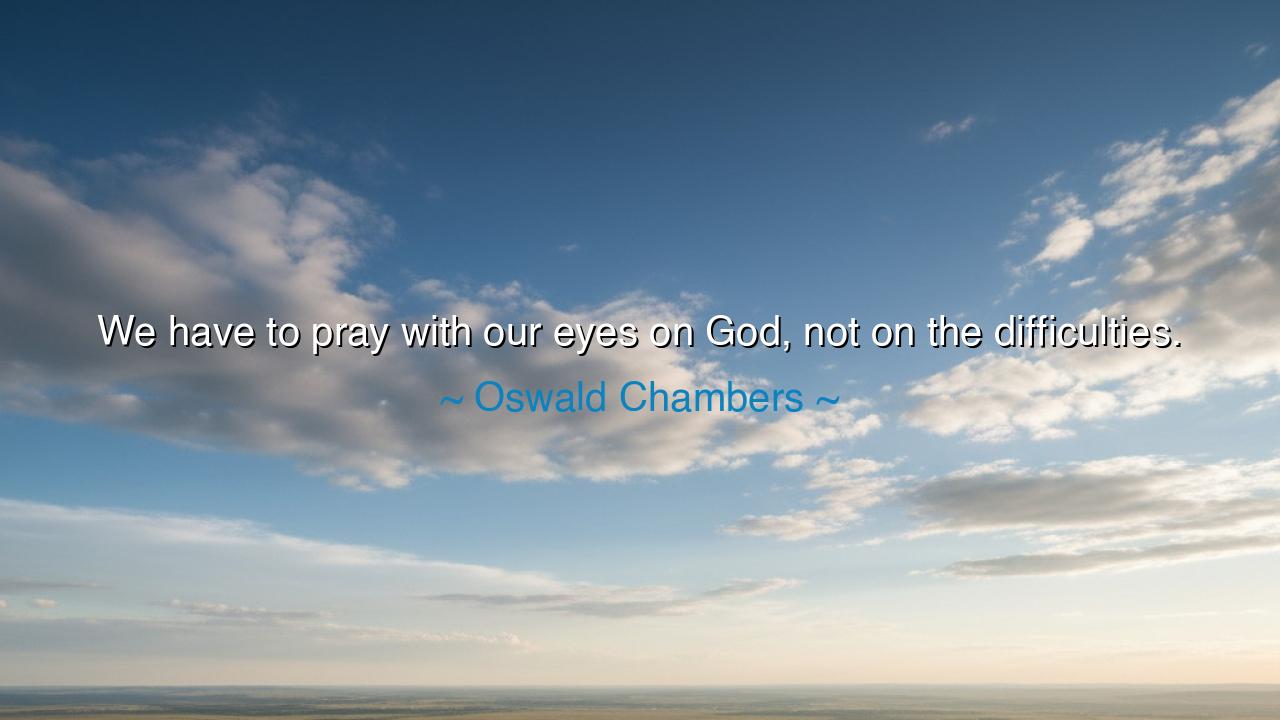
We have to pray with our eyes on God, not on the difficulties.






"We have to pray with our eyes on God, not on the difficulties." Thus spoke Oswald Chambers, the Scottish preacher whose words burned with quiet fire and whose faith was tested in the crucible of war and hardship. In this simple yet thunderous sentence lies a truth that has carried saints and seekers through the darkest nights: that faith is not the denial of struggle, but the refusal to be ruled by it. When we fix our eyes upon God, the Author of all strength and mercy, we are lifted above the storm; but when our gaze falls upon the difficulties, our hearts grow heavy, and the very prayer meant to free us becomes a chain.
Chambers knew well the weight of human trial. He lived through the trembling years of the First World War, serving not as a soldier of the sword, but as a soldier of the spirit—ministering to weary men in the dust of Egypt, far from home and hope. It was there, among tents filled with broken bodies and fearful hearts, that he saw how the human soul can sink when it stares too long at despair. He taught those soldiers that prayer is not an escape from reality, but a lifting of the soul toward divine reality—that to pray rightly is to look upward, not inward; to trust the infinite strength of God, not the fleeting strength of man.
To pray with one’s eyes on God is to turn from the shadows and face the light. It is to remember that though the waves may roar, the sea obeys a greater command. The ancients spoke of this same truth when Peter, walking upon the waters, faltered only when he looked at the wind instead of at Christ. The moment his gaze turned from divine presence to mortal peril, his faith sank, and so did he. Thus, Chambers calls to us across the ages: do not let your prayer be consumed by your fear. When you look to God, your burden is lifted; when you look to your difficulties, it multiplies.
Think also of Corrie ten Boom, the Dutch woman who endured the horror of Nazi concentration camps. Surrounded by cruelty and loss, she might have surrendered to despair. Yet in the darkness of Ravensbrück, she kept her eyes upon the God she could not see, trusting that His hand still held her soul. She prayed not for escape, but for strength; not for vengeance, but for faith. And in that faith, she found peace that defied reason. Her story, like Chambers’ teaching, is proof that when the soul prays with its gaze fixed on divine goodness, the flames of suffering cannot consume it.
But to pray thus requires discipline of spirit. The heart is easily distracted, pulled down by fear, doubt, and the clamor of earthly trouble. True prayer begins when the soul silences the noise of its worry and turns its full attention toward the eternal. This is not ignorance of difficulty, but transcendence of it. The wise know that God’s power does not remove all storms—it teaches us to walk through them unafraid. And so, prayer becomes not a cry of despair, but a song of trust sung amid the tempest.
Oswald Chambers’ wisdom is not merely religious—it is deeply human. It speaks to anyone who has faced darkness: the soldier in battle, the mother in sorrow, the wanderer in doubt. It reminds us that the direction of our gaze determines the condition of our heart. If we look always upon the problem, it grows; if we look upon the Divine, the problem shrinks before His glory. Life will always bring mountains, but it is faith that moves them—not by force, but by steadfast sight fixed upon the Eternal.
And so, dear listener, let this teaching be carved upon your spirit: pray with your eyes on God. When the path is dark, lift your gaze higher. When fear whispers, turn your thoughts to Him who neither slumbers nor fails. Let your heart, like a compass, always find its true north in divine presence. For prayer is not meant to magnify our troubles, but to magnify the One who overcomes them.
Thus, the lesson endures: where your eyes rest, there your spirit follows. Fix them not upon the storm, but upon the One who calms it. Do not measure the depth of your difficulty, but the greatness of your God. In this way, your prayers will not be cries of despair, but declarations of victory; not pleas for rescue, but affirmations of faith. For the eyes that look to heaven will never drown in the sea of fear.






AAdministratorAdministrator
Welcome, honored guests. Please leave a comment, we will respond soon